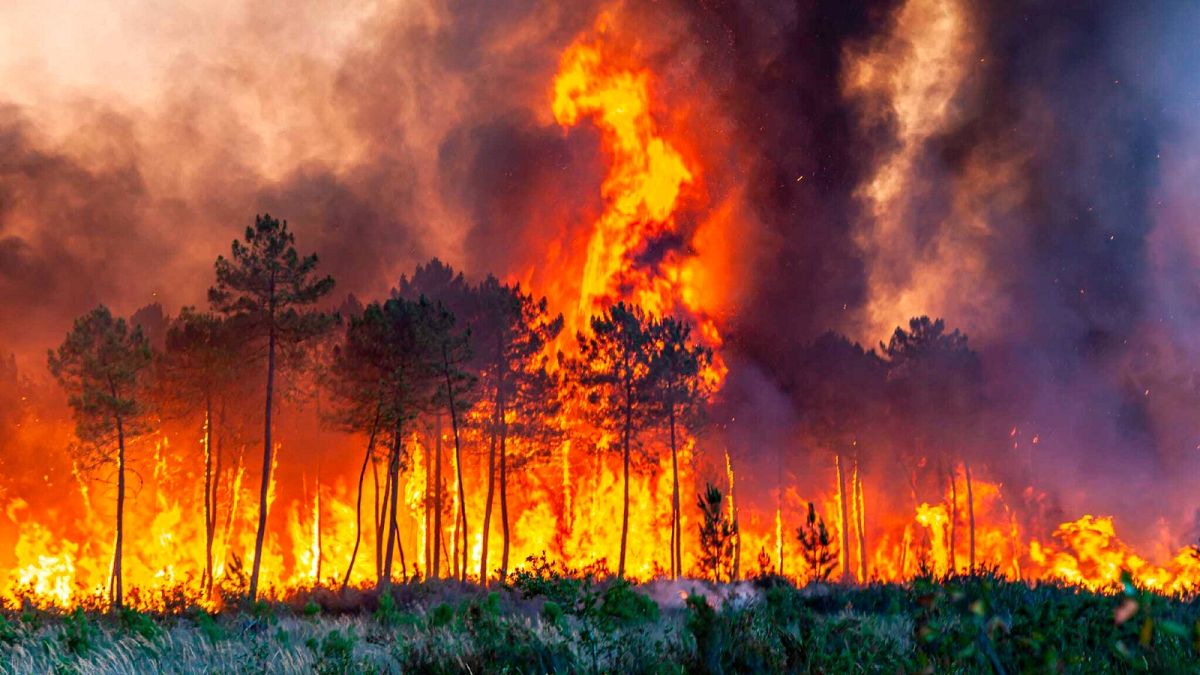The EU's 27 member states spent 0.5% of their expenditures on fire-protection services in 2019, according to Eurostat. That's roughly the same as in 2001.
The European summer season is increasingly the theatre of apocalyptic scenes as heatwave-fuelled fires scorch thousands of acres of land.
Yet government expenditure on fire-protection services has largely remained on par with where it was at the turn of the century.
The 27 member states of the European Union spent a combined €30.9 billion on fire-protection services in 2019, according to the bloc's official statistics agency, Eurostat. More recent data is not yet available.
This amounted to about 0.5% of total government expenditure at the EU level, a figure that has remained stable since 2001, Eurostat added.
Yet, not all states spend the same. Bulgaria spends about 0.9% of its total expenditures on fire-protection services, while Denmark just 0.1%.
Of the Mediterranean member states, which are traditionally the most impacted by wildfires, France meets the EU average (0.5%), Greece is slightly above (0.6%), while Spain, Italy and Portugal are just below (0.4%).
Fires increasingly moving north-wards
Control efforts in so-called EUMED 5 — France, Italy, Greece, Portugal and Spain — have been effective, as the burnt area has slightly decreased since 1980, according to the European Environment Agency (EEA).
But there is "large interannual variability" based on meteorological conditions, the EEA noted, underlining that the burnt area in 2017 across the EUMED5 was the second largest on record, due in particular to unprecedented fires in Portugal, whereas the burnt area in 2018 was the lowest on record.
The year 2018 was also noteworthy because more countries suffered large forest fires than ever recorded before, including in central and northern Europe, which were usually spared from fires. Sweden, for instance, experienced its worst fire season ever that year and requested international fire-fighting assistance.
In fact, forest fires accounted for 17% of the requests for assistance through the EU Civil Protection Mechanism between 2007 and 2021.
According to European Commission figures, the mechanism —which allows member states or third countries to request assistance if their own capacities are overwhelmed by a disaster — was activated an average of 6.5 times annually between 2007 and 2019 solely to combat forest fires.
The following year constituted a lull, with just one such request, while nine were made last year, including by EU neighbours such as Türkiye, Algeria, North Macedonia and Albania.
2021 became the second-worst wildfire season in the EU since 2000, surpassed only by 2017 when over 1 million hectares (ha) burned in the EU. At least 86 people lost their lives.
Drought and fires
As predicted, the 2022 season is also proving particularly tough. At least three people have now lost their lives as they took part in firefighting efforts including the pilot of a fighting aircraft in Portugal and two crew members of a firefighting helicopter in Greece.
Hundreds of firefighters in Portugal, Spain, Italy and France were tackling multiple blazes on Monday.
These are fanned by a heatwave pushing temperatures in some parts above 40°C and facilitated by a months-long drought in Europe that "could become the worst ever", Maroš Šefčovič, the European Commission's vice-president for inter-institutional relations, already warned in early June.
The EU sought to prepare its resources better ahead of this season, pre-positioning more than 200 firefighters from multiple member states in Greece, where shocking scenes of people rushing to boats to flee flames in the dead of the night were observed in Evia last year.
The Commission also financed the stand-by availability of a rescEU fleet of 12 firefighting planes and 1 helicopter put together by Croatia, France, Greece, Italy, Spain and Sweden and at the disposal of other member states in case of an emergency.
